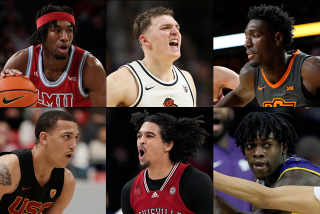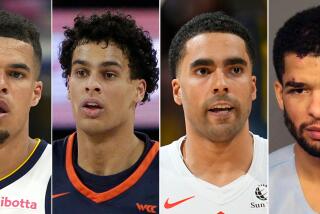Floor Burns
- Share via
Amid the accolades from all the basketball experts who hailed JaRon Rush as a blue-chip recruit in high school, there also were rumors and whispers.
Even as Rush showed flashes of brilliance at UCLA, scoring the winning basket in an upset of Stanford two seasons ago, people talked quietly of his erratic behavior.
When he left college early, caught accepting cash from a youth coach and an agent, NBA executives spoke of his explosive first step, but also mentioned “off-the-court” issues.
The final clue turned up over the winter when, ignored in the draft, the 6-foot-7 forward joined the Los Angeles Stars of the minor league American Basketball Assn. and soon took leave. No announcement, no reason given.
Twice, his agents arranged for him to discuss the situation with a reporter. The meetings were canceled. Instead, his agents released a statement confirming their client had recently been treated for alcoholism.
“Since the completion of his rehabilitation program, JaRon has successfully maintained his sobriety,” the statement said.
The 22-year-old had nothing to say beyond the few sentences contained in the release. But a year since he slipped from the spotlight, with another NBA draft coming up, a portrait of him emerges from interviews with friends and federal documents obtained by The Times.
They depict a good-natured young man who found himself in bad situations and made bad choices. They offer a map of the rocky path he has taken since his days as a schoolboy phenom, the jewel of UCLA’s 1998 recruiting class.
The tale begins in Kansas City a decade ago, when an 11-year-old Rush was spotted by wealthy businessman Tom Grant. Grant was known for sponsoring youth teams and donating to a fund that sent minority kids--not just athletes--to private schools.
After meeting JaRon and his younger brother Kareem, Grant helped them get into the Pembroke Hill in 1993.
With its stately red-roofed buildings overlooking a park south of downtown, the school was a change from the poor streets where the Rushes lived. Instead of going home after class, JaRon began spending afternoons and evenings at Grant’s house, playing ball with Grant’s three sons.
“He ate dinner with us a lot,” Grant said from Kansas City. “JaRon has always been a sweet kid.”
Rush eventually became a member of the household, earning an allowance for doing chores and getting the use of a leased car when he was old enough to drive. Everyone was happy with the arrangement until Rush’s junior year when, according to documents, he began coming home drunk.
Grant would not discuss the matter with a reporter. But he and others were compelled to talk to federal agents in the recent case against the youth coach who paid Rush.
The U.S. Attorney’s office accused Myron C. Piggie of giving $35,500 to five players, among them the Rushes and Corey Maggette, now with the Clippers. Piggie pleaded guilty last May to federal charges and awaits sentencing.
While covering the case, The Times obtained reports of FBI interviews in which witnesses talk not only about Piggie’s crimes but also about Rush’s troubles.
As a junior, Rush began staying out late to party with friends, Grant and another witness told the FBI. It certainly did not show up on the basketball court where his speed and grace earned him a reputation as one of the nation’s best high school players.
Still, Grant worried.
“Grant would attempt to ground Rush and to take away the Geo Tracker that he had leased for Rush,” an FBI report says. “ . . . Grant took Jarone [sic] Rush to see a [psychologist] because he felt Jarone [sic] was close to becoming an alcoholic.”
These efforts widened a rift between Grant and Rush’s family, especially his mother, Glenda. According to documents, she accused Grant of pressuring JaRon--by then a top recruit--to attend Grant’s alma mater, Kansas.
Glenda Rush could not be reached for comment. Grant has denied trying to influence JaRon.
Even so, the tension could not have helped their relationship. When Rush broke curfew and skipped tutorial sessions, Grant tried to discipline him. Rush began spending time with Piggie.
They had known each other for years in the insular world of Kansas City basketball. Then Piggie became Rush’s coach, hired to run a summer team Grant sponsored.
As Rush’s basketball stock rose, prosecutors say, Piggie tried to curry favor by giving him $200 and $300 at a time and paying $5,000 for the lease of a Chevrolet Blazer so Rush would not have to rely on the car Grant kept taking away.
When Rush stayed out nights, Grant called Piggie’s house and the coach said he was watching over the teen. To some degree, Rush’s grandmother, Jeanette Jacobs, also worried. She wanted her grandson to attend UCLA, Rush later told the FBI, “to move away from home so he could grow up.”
He joined Jerome Moiso and Dan Gadzuric in one of the best Bruin recruiting classes ever, but the change of scene did no good. If anything, sources say, alcohol began to impact his play.
Early in the 1998-99 season, the freshman missed a game after failing to return from Christmas break in Kansas City. His absence was attributed to homesickness. Grant told agents Rush was partying with friends.
At that point, the businessman contacted Rush’s family and suggested JaRon check into a substance-abuse clinic. The next day, Rush returned to Westwood.
His two seasons as a Bruin were marked by ups and downs. At times he sparkled, averaging 11 points and seven rebounds, making the Pacific 10 all-conference freshman team. At times he disappointed, never quite living up to expectations.
In and around the team, sources say, people quietly debated what to do about his drinking.
And the secret money continued. With Piggie out of the picture, Rush alleged that a new benefactor, Los Angeles sports agent Jerome Stanley, slipped him $50 payments in a parking lot. Stanley has denied the allegation.
It all caught up with Rush in January 1999, when federal agents came to his door to ask about Piggie. The following November, he testified before a grand jury and, when agents returned to UCLA in December, it was clear large sums of money were involved.
The U.S. Attorney estimates Rush got $17,000 in cash and gifts from Piggie. As a result, the NCAA made UCLA repay $45,321 of its 1999 tournament revenue for having used an ineligible player and Rush sat out 24 games of the 1999-2000 season.
Though he later returned--stealing the ball and scoring with three seconds left in that victory at No. 1 Stanford--his sophomore season was reduced to nine games in which he averaged 12 points.
“It was very frustrating,” he said last May. “It was very hard, what the NCAA did to me. I felt like I just couldn’t handle it anymore.”
NBA executives saw great physical gifts in the underclassman but wondered about his jump shot and slight build. They mentioned those “off-the-court” issues.
It did not help when Rush skipped a pre-draft camp in Chicago, then fared poorly in individual workouts. In one, with the Charlotte Hornets, he looked out of shape and team officials ended the session early.
“I’d like to know who’s telling this kid to come out,” an NBA executive said.
Rush settled for the ABA, signing with the hometown Kansas City Knights before being traded to Los Angeles. The deal put him on the same team as one of his idols, former Bruin Ed O’Bannon. Within weeks, however, Rush checked into a voluntary rehabilitation program.
The news since then has been encouraging.
The Stars reinstated him for the last few games of the season and, though his playing time was limited, team officials were impressed by his performance in practice and games.
“Whatever problems JaRon faced, he’s faced them like a man,” General Manager Steve Chase said. “He’s such a good kid, everyone wants to see him get straightened out. . . . It’s almost frightening how good he might be when he’s in better shape physically and mentally.”
These days, Rush is playing in a summer league and working with a personal trainer, adding muscle to his 215-pound frame. He is also practicing with former Bruin teammate Earl Watson, who, according to the statement, “has never seen JaRon as focused as he is now, or in as good of physical condition.”
His agents, Brian Kramer and William Haberman, have been keeping careful watch over their client in hopes that one day he will get another shot at the NBA.
In Kansas City, Grant has high hopes as well. The businessman remains close to Rush and paid for his rehabilitation. He speaks with pride of Rush’s sobriety.
“The toughest thing to say is, ‘Yes, I’m an alcoholic,’ ” Grant said. “JaRon is at that point in his life and he’s dealing with it.”
This accomplishment, Grant figures, ranks with the biggest victories Rush has earned on the court.
“He’s had some bad things happen to him,” Grant said. “But he has grown up.”
*
Times staff writer Lisa Dillman contributed to this story.
More to Read
Go beyond the scoreboard
Get the latest on L.A.'s teams in the daily Sports Report newsletter.
You may occasionally receive promotional content from the Los Angeles Times.











